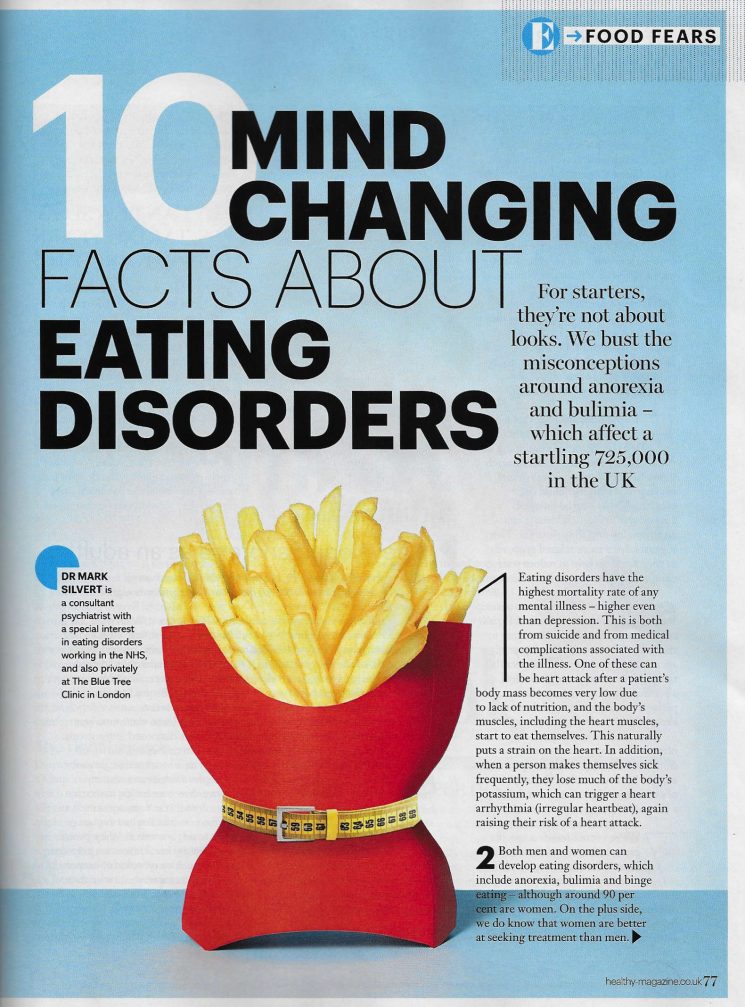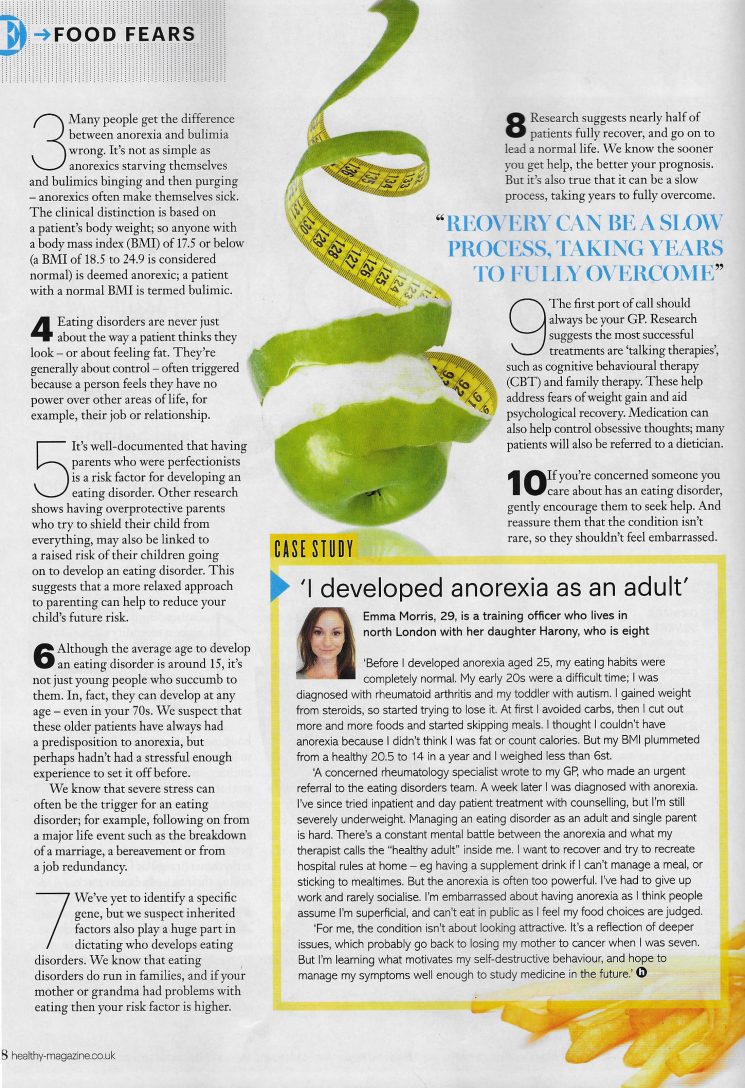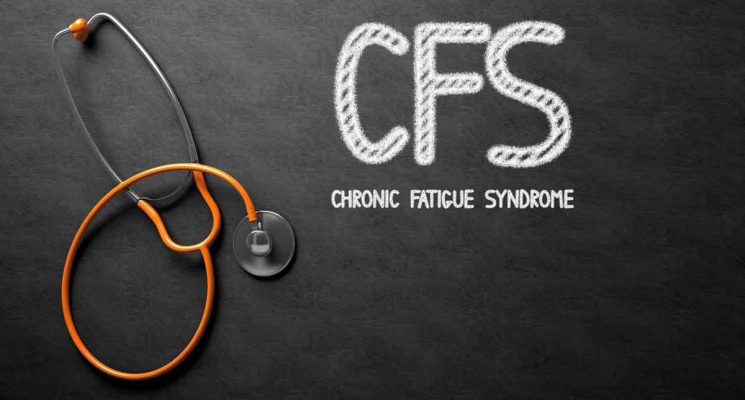10 Mind Changing Facts About Eating Disorders
10 Mind Changing Facts About Eating Disorders
Dr. Silvert, our founder, and expert psychiatrist is featured in Healthy Magazine. Dr. Mark Silvert is a Consultant Psychiatrist with a special interest in eating disorders working in the NHS, and also privately at The Blue Tree Clinic in London.For starters, they are not about looks. We bust the misconceptions about anorexia and bulimia - which affect a starting 725000 in the UK.
Regardless of whether you eat too little or too much, eating habits are regularly an indication of how we feel within. Our specialists are here to offer professional support in a non-judgemental, caring and collaborative approach to feel good about yourself and to take care of your general wellbeing. We offer help for those suffering from anorexia, bulimia, binge eating disorders and the families and carers of those that are unwell.
Read about the 10 fascinating facts you didn’t know about eating disorders;


Contact our friendly team of experts for a safe, comfortable conversation.
Please call us on 0800 011 9883 or contact us online here.
Source URL: https://thebluetreeclinic.com/10-mind-changing-facts-eating-disorders/
Stress | Help, Support & Treatment |The Private Therapy Clinic, London, UK

Stress | Help, Support & Treatment |The Private Therapy Clinic, London, UK
Life can be challenging. Sometimes the pressures we are under become overwhelming. Let us help you get your life back on track by showing you new ways to manage stress, so that you can reclaim control over your own life.
What is Stress?
Stress is where an individual feels they are under a lot of pressure causing an inability to cope. Stress can arise from a variety of different factors however when the stress cannot be controlled it can cause problems for the individual, mentally, emotionally and physically.
What are the symptoms?
– Tiredness
– Difficulty sleeping
– Loss of appetite
– Lack of concentration
– Headache
– High blood pressure
– Moodiness
– Irritability
– Loneliness
– Unhappiness
– Nervous habits
– Nausea
– Worry
If you believe you are suffering from some of the symptoms stated above therapy may be beneficial to you. Here at The Blue Tree Clinic our therapists and doctors are here and ready to help you deal with your Stress.
What are the types of Stress?
There are many different types Stress which range from mild to extreme;
Acute stress
Episodic acute stress
Chronic stress
How can therapy help?
Therapy can help you to understand the reasons behind why you have a sleep disorders as well as teaching you ways to cope and methods to help you sleep. Therapy has been shown to be extremely effective for individuals with sleeping disorders.
Types of therapy offered for Stress at The Blue Tree Clinic?
– Cognitive Behavioural Therapy
– Cognitive Analytic Therapy
– Psychiatric Assessment
It may be that our team believe you would benefit from medical help as well as therapeutic help in which case we may suggest private psychiatric treatment where a psychiatrist will assess you and decide whether physical tests or medication would help. It has been found that medication can at times be successful in helping individuals suffering from Stress.
How can The Blue Tree Clinic help you?
Stress is a part of everyday life but when stress begins to take over your life you should consider looking for help. At The Blue Tree Clinic, Private Therapy Clinic - we want to help you! Stress is unpleasant for everyone regardless of the cause. Stress is not only problematic for you but also your body, your mind and your mental wellbeing. Here at The Blue Tree Clinic we have professionals who are trained in helping you fight your stress. Our therapists will assess your symptoms and look into providing the best possible care for you.
Your therapist will begin to give you therapy, this may be from one therapy type or multiple. Gradually your therapist will teach you tool and techniques which can help you to relieve your stress and allow you be more relax and calm. Your therapist will ensure that you are able to use these techniques outside of the therapy setting in a way that suits you. We know stress can be hard to control so your therapist will make sure you are well equipped to deal with stressful situations after you have finished your therapy with us.
Source URL: https://thebluetreeclinic.com/stress/
The psychological impact of being robbed

The psychological impact of being robbed
Blue Tree intern Maddy Lykourgos discusses the impact of crimes such as burglary…
Breaking news stories exhibiting criminal activity continue to percolate all media making us feel unsettled at the possibility that we could be next. The thought that someone intends to do us harm as an individual can leave us feeling confused and powerless, wondering what we could’ve done to prevent it. Theft-related offences make up a large percentage of crimes reported, and statistics are disproportionally high in London. As much as the media may focus on the psychology of the perpetrator, society often forgets about those who fall victim to such crimes; their suffering can far exceed the replacement of mere belongings.
With the example of burglary, even without any personal items being taken, having a stranger in your house, without your knowledge, can feel like a violation of your space and of your security. This level of distress often causes individuals to blame themselves, perhaps for not locking a window, or double-checking that the door was bolted. This may be made worse by the loss of significant and irreplaceable items, preventing people, especially young children being assured that they can feel safe in their homes again and sleep through the night.
It is vital to remember that being burgled is not your fault. Nonetheless, the traumatic impact of a burglary can linger, even after this rationalisation. Some people may cope by taking control back and improving home security to stop it happening again. A few things that can give people peace of mind are leaving lights on when the property is vacant, double (or even triple) checking locks or pooling community funds for nightly patrol cars.
However, the extent to which this type of crime can affect us is often unexpected and underestimated. Anger, fear, vulnerability and even physical symptoms, like nausea and headaches, comprise some of the reactions to this type of trauma that people may experience. Although most people don’t suffer long-term from a crime of this sort, occasionally the emotional distress can leave you feeling symptoms of anxiety, post-traumatic stress disorder or depression that may persist.
It is important that you don’t ignore these symptoms. People are all too quick to try and ‘get over it’, but it’s important to work through at a pace that suits you. Counselling and cognitive behavioural therapy are just some of the ways to provide support in managing the emotional impact of crime.
If you find yourself suffering due to burglary or any other crime, get in touch with our Private Psychologist for more information on how we could help your cope following your traumatic experience.
Source URL: https://thebluetreeclinic.com/psychological-impact-robbed/
Our Psychiatrist’s Column on Anti-Depressants Study in the news last week

Our Psychiatrist’s Column on Anti-Depressants Study in the news last week
As a consultant psychiatrist I have received a tonne of emails and messages in the past week about the news relating to the Lancet’s publication of the meta-analysis of 522 randomised control trials into the effectiveness of anti-depressants.
And people want to know what I think, seeing as I prescribe anti-depressants on most days of the week. Fair enough. So this is what I think..
I think it’s irresponsible journalism to yell from the roof tops that up to one million of us should be taking medication for depression. For the record Professor Geddes, said “It is likely that at least one million more people per year should have access to effective treatment for depression, either drugs orpsychotherapy.”
He did not say one million people need to be on medication.
Do we really want to become a mini-America? I think we know the answer to that.
Rewinding for just a second here, before I was even a headache in the Dean of Admission’s brain when I was re-applying to medical school I was prescribed anti-depressant medication. So I don’t need these double blind RCTs to tell me that anti-depressants are not a placebo. Thanks anyway.
In a 12 month period whilst at school my grandmother died from lung cancer very suddenly, my mother was diagnosed with a brain tumour and my aunt, who was my inspiration and role model to apply to medicine, was diagnosed with a terminal brain tumour and passed away. And I was about to fail my A-levels in spectacular fashion.
My world felt a bit precarious to say the least and I was very anxious. So before long, I found myself sitting on a charming elderly psychiatrist’s couch. He was kind and empathic and after talking to me for a while, he wrote me out a script for Paroxetine. Big mistake.
Placebo? What placebo. The next day I felt amazing. Anxiety? What Anxiety?
I was experiencing the high you get as if main-lining “Californian Rocket Fuel”. A term popularised by the psychiatrist Stephen Stahl when you get a hit of serotonin and noradrenaline.
But the problem was that I really did not need medication, I was not depressed. I was dealing with some difficult life situations. Family bereavements of dearly loved family members and pure fear of the future with a dash of adolescene thrown in for good measure.
The medication made me worse at a time when I needed stablility and some good therapy, not taking off like Falcon Heavy into the Florida sky.
It also made me numb to what was going on. I felt great. I did not care about school, my grades or well anything really. I had gone from the sublime to the ridiculous. And don’t get me started on the weight gain that took me many years to sort out afterwards.
It did, I hope, however make me a better psychiatrist many years later.
Because hearing all this you might think I am anti-medication. Nothing could be further from the truth. If I had been unable to get up in the morning, go to work, or school, or felt suicidal – If I was unable to function well, then the decision to take medication would have been the correct one.
But I was only mildly anxious, not unable to live my life. There are too many people on medications that do not need to be on them.
Life can be difficult and throwing pills at a patient is not the answer.
GPs have 10 minutes, so when you go in with your problems, emotional, sexual, physical, financial, do you think they have time to help? Very unlikely. They are not God. They are stressed out often more than you are. Not a recipe for success.
So now this study has come out – you are going to leave your primary care doctor with a script of escitalopram instead of fluoxetine. Hoorah! That’s going to help you. Bye. Next patient please.
What a sorry state we find ourselves in.
Medications help the symptoms of depression and anxiety, but they don’t cure the under-lying problem, and this is what I explain every single day to my patients. I am delighted to help people that need medications to help them get back to work, stop their obsessive thinking, their severe anxiety and depression, eating disorders and psychotic illnesses. However for some common mental health problems, if you want to solve it, get a psychiatrist who does more than write you a script and says “see you in six months for review”.
Get a therapist you like and trust, who practices a therapy that is evidence-based and you feel works for you. Genetics also plays a huge role in who may or may not get depression, and there is nothing we can do about that. So you may indeed need medication for a long time, possibly for life, but it still needs monitoring and lower doses are better than higher ones.
Every week in clinic I get patients from around the world, (especially, yes you guessed it, the good old U.S. of A) on a cornocopia of pills that they do not need or have long stopped working in the way they were intended to.
In my case I was given an SSRI (antidepressant) medication and left on it without any check-ups until I took matters into my own hands, and stopped it by myself. I was 17, I had no idea what I was doing. But I knew that gaining kilogram after kilogram and failing my A-levels because I simply did not care about them or anything else at that time was not a recipe for success.
The inappropriate use of medication when I was pre-med, has hopefully made me a better doctor. Because this doctor will not be writing you a script for anti-depressants unless you really need it and we think it through over an hour, not in 10 minutes.
Source URL: https://thebluetreeclinic.com/psychiatrists-column-anti-depressants-study-news-last-week/
New Year fresh start | The Blue Tree Clinic
New Year fresh start | The Blue Tree Clinic

For what reason Can't I Keep My New Year's Resolution?
Blue Tree assistant and yearning psychologist Maddy Lykourgos depicts the weights of another year and the feared resolutions…
Happy New Year from your group here at The Blue Tree Clinic!
It's that season once more, once the festivities are finished and the hard work appears to start. There's a specific weight on beginning the year new and making uncommon improvements, at the end of the day, New Year's resolutions; guarantees to ourselves that we haven't possessed the capacity to keep consistently, however with a new beginning comes a crisp chance to accomplish something that has beforehand been unachievable. In any case, just around 10% of individuals that influence resolutions to wind up adhering to them for more than a couple of months, regardless of whether it's sparing cash, doing the activity or finding a side interest. Now in January we have a tendency to get a thought of how these resolutions may go, be it that things are working out as expected, we continue putting off our begin date or we make reasons to squeeze delay excessively frequently. The inquiry remains: for what reason do as such a large number of us battle to keep New Year's resolutions?
Remember that we have a tendency to be animals of habit. Huge numbers of us apparently work best with a set routine and require something exceptional to occur with the end goal for us to definitely change our ongoing examples of conduct. The social desire of this constrained change can have its own particular outcomes. Lamentably, another year isn't sufficiently noteworthy all alone for the vast majority of us to roll out an improvement, and it, for the most part, doesn't come at an advantageous time and henceforth objectives end up plainly impossible.
Considering the measure of subjective exertion it takes to truly roll out a positive improvement in our lives, this shouldn't make us contrarily ponder our self-esteem or debilitate us from attempting once more. It takes being in the correct mentality to truly focus on rolling out a generous improvement. For example, only saying you will attempt to stop smoking may not be sufficient, but rather recognizing yourself as a non-smoker and genuinely trusting it will upgrade your odds of finishing it. On the off chance that you are encountering a lot of strain or pain subsequently, please get in contact with us here at The Blue Tree Clinic to perceive what help we may bring to the table you.
Here are a couple of little tips on how to help influence your resolutions to stick:
Set SMART objectives: this method is frequently utilized as a part of Cognitive Behavioral Therapy (CBT) and since the fundamental standards of CBT are tied in with changing our mindsets so as to accomplish distinctive results in our day by day life, it appears a decent place to begin. Targets ought to be:
Particular: don't attempt to do excessively across the board go. Pick one viewpoint you wish to change and stick to it. What precisely is your coveted result?
Quantifiable: endeavour to lay out markers or set amounts with the goal that you can tell how you're doing. For instance, chopping down the measure of sugar you eat may mean eating close to one sugary item every two days.
ACHIEVABLE: how likely is it that following this specific arrangement will lead you to your final product?
REALISTIC: Be down to earth about what you may by and by having the capacity to do. It's no utilization defining unattainable objectives that will, thusly, fortify a failure to finish them. Separating an objective into shorter-term destinations can diminish the measure of exertion expected to achieve it.
TIME-BOUND: setting up a time allotment can help manage your new arrangement of practices. Truth be told, numerous resolutions flop just in light of the fact that we don't know to what extent to convey them on for.
Tell somebody: you can even work with your companions towards a shared objective. Changing your propensities can be troublesome, so having somebody in your corner to help you, taking without end allurement or participate to roll out the improvement can truly enhance your odds of accomplishment.
Try not to be too hard on yourself: while stopping an unfortunate propensity or confining certain practices, it is normal to blunder. In spite of the fact that it is a piece of the learning procedure to rewire our already programmed forms, slips abandon us feeling remorseful about giving in, or as if we have fizzled ourselves and people around us. For some additional help around fighting addictions, or for some guidance on the most proficient method to forestall them assuming control, we offer a scope of medicines here at The Blue Tree Clinic.
Make sure to commend your advance. Rolling out an enduring positive improvement is never simple, so concentrate on how far you have come. Good fortunes to the individuals who are overcome enough to go up against the New Year's Resolutions.
Source URL: https://thebluetreeclinic.com/3424-2/
Therapy for Children | The Blue Tree Clinic
Therapy for Children | The Blue Tree Clinic

What is Therapy for Children?
Private Child Psychiatrist London can be helpful for people of all ages and particularly for children. Research has demonstrated that therapy can help children to even before the age where they start to talk. Here at The Blue Tree Clinic every one of our patients is vital even the modest tots! So we are to disclose to you a little about the huge assortment of treatment that is accessible in the UK so that if you trust your kid needs therapy you can make a method of reasoning and data construct choice in light of what therapy is most appropriate for your child. We see children who have been battling with their folk's separations, contentions or issues. children can regularly have issues at school, for example, tormenting or absence of certainty when they don't pass exams.
Our Team
Our therapists are benevolent, patients and minding. There are distinctive kinds of therapy accessible the inquiry you may have is what are the advantages of therapy for children?– If a tyke is experiencing a psychological well-being issue or has endured an awful mishap treatment can help the youngster through the circumstance guaranteeing that the issue does not grow into their youth and later life.– It allows them to converse with somebody who isn't their parent or family.– It can enable kids to build up their certainty and social skills.– It is imperative to recall that these are a chosen few treatments for kids, with the plan to give you a general outline of what is accessible, and there are numerous different treatments which might be more valuable to your kid.
Source URL: https://thebluetreeclinic.com/therapy-for-children/
Chronic Fatigue Syndrome |The Blue Tree Clinic
Chronic Fatigue Syndrome (CFS)
Blue Tree understudy and trying analyst Maddy Lykourgos plots CFS…

As the days are getting shorter, it appears as though there's something else entirely to do in a shorter space of time. Awakening and returning home oblivious befuddles our psyches into supposing we ought to be sleeping sooner, and regularly individuals do feel more worn out with less vitality all through the winter time. Notwithstanding, many individuals endure this sort of tiredness lasting through the year. Incessant Fatigue Syndrome (CFS), also called Myalgic Encephalitis (ME), is a therapeutic condition classified essentially by a long haul weariness that meddles with one's capacity to do day by day assignments.
What are the regular side effects of CFS?
Physical:
- Serious weakness, declining with physical movement
- Issues dozing
- Fluey side effects e.g. cerebral pains, sore throat, wooziness, general sentiment being unwell
- Queasiness
- Muscle and joint torment
- Heart palpitations
Intellectual:
- Feeling rationally depleted
- Trouble concentrating
- Trouble recollecting data
Keeping in mind the end goal to be determined to have CFS the indications must continue for more than 3-4 months, subsequent to having discounted different clutters with comparable side effects.
What are the reasons for CFS?
The reasons for CFS are still genuinely under-explored. Be that as it may, a couple of speculations in regards to contributing variables incorporate diseases like pneumonia or glandular fever, hormonal uneven characters, hereditary inclinations and emotional wellness issues. Similarly as with many disarranges that are misconstrued and hard to demonstrate, there can be a deplorable shame around the disorder. This can make side effects much more hard to oversee. Thusly, it is essential to get bolster for the two parts of the disorder.
Step by step instructions to adapt to CFS
A great many people enduring with CFS improve time and those that are more youthful will more probable make a full recuperation. In any case, for those that keep on suffering, there are three principle medicines for CFS: torment administration drug, Cognitive Behavioral Therapy (CBT) and Graded Exercise Therapy (GET). With regular exercises ending up progressively troublesome as indications intensify, it is as vital to get bolster around emotional well-being as physical wellbeing.
What can The Blue Tree Clinic improve the situation you?
We have an exceedingly concentrated multidisciplinary group that can enable you to deal with your analysis in each part of every day life. This incorporates: therapists, to oversee CBT to feel more responsible for your side effects and see how your practices may affect them; specialists, to endorse drug (if vital); nutritionists, to help with rolling out way of life improvements around nourishment and exercise; and specialists in care to help with unwinding strategies that can be utilized for the duration of the day.
Enquire now for a carefully fit treatment design.
Source URL: https://thebluetreeclinic.com/chronic-fatigue-syndrome/